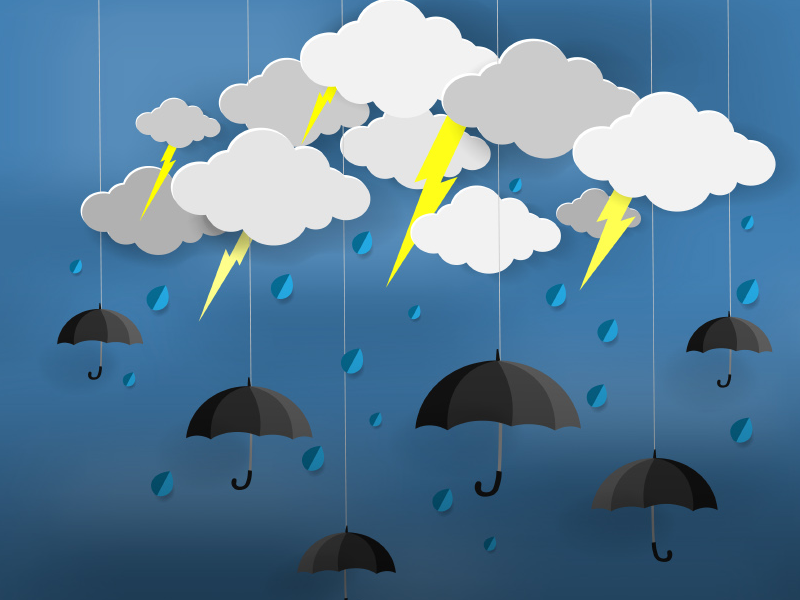12 essential precautions for safety and comfort
NAVIGATING RAINY WEATHER:

- 129
- 0
Rainy weather can be both enchanting and challenging. While it brings the earth to life with its nourishing touch, it also presents a myriad of risks and inconveniences. Whether you're venturing outside or staying cozy indoors, taking precautions during rainy days is paramount. Let's explore twelve essential measures to ensure safety, comfort, and peace of mind during rainy weather.
- Stay Informed: Keeping abreast of weather forecasts and updates is the first step in preparing for rainy days. Pay attention to weather advisories, especially during the rainy season or in regions prone to heavy downpours. Understanding the forecast allows you to plan your activities accordingly, whether it's a leisurely stroll or a commute to work.
- Proper Footwear Matters: The right footwear can make all the difference during rainy weather. Invest in waterproof boots or shoes with slip-resistant soles to navigate through puddles and slick surfaces safely. Keeping your feet dry not only prevents discomfort but also reduces the risk of slipping and falling.
- Carry an Umbrella or Raincoat: An umbrella or a reliable raincoat is your shield against the elements when stepping out into the rain. Opt for sturdy umbrellas that can withstand gusty winds, and ensure your raincoat provides adequate coverage to keep you dry from head to toe. Being prepared with these essentials ensures you're ready to face whatever the weather brings.
- Drive with Caution: Driving in rainy conditions requires extra caution and attention. Reduce your speed, maintain a safe distance from other vehicles, and use headlights for visibility, even during the day. Beware of hydroplaning on wet roads and avoid driving through flooded areas to prevent accidents and damage to your vehicle.
- Avoid Standing Water: Puddles and flooded areas may seem innocuous but can conceal hidden dangers. Avoid walking or playing in standing water, as it may hide open drains, sharp objects, or even submerged electrical wires. Steer clear to prevent accidents and minimize the risk of injury.
- Keep Gutters Clear: Prevent waterlogging and potential flooding around your home by keeping gutters and drains free of debris. Regularly inspect and clean them to ensure rainwater can flow freely, reducing the risk of water damage to your property and minimizing the chances of mold and mildew growth.
- Secure Outdoor Furniture: Strong winds often accompany rainstorms, posing a threat to outdoor furniture, umbrellas, and other loose objects. Secure or bring them indoors before the onset of heavy rain to prevent damage or displacement. Anchoring or storing these items protects both your property and your neighbors'.
- Check for Leaks: Inspect your home for leaks in the roof, windows, and doors before the rainy season sets in. Address any areas of concern promptly to prevent water seepage and potential damage to your property's structure and interior. Proactive maintenance saves you from costly repairs down the line.
- Stay Away from Rivers and Streams: Rising water levels during heavy rain can turn peaceful rivers and streams into hazardous torrents. Avoid walking or playing near water bodies during rainy weather to minimize the risk of accidental slips or being swept away by fast-moving currents. Exercise caution and adhere to safety guidelines provided by local authorities.
- Use Mosquito Repellent: Stagnant water, a common sight during rainy weather, provides breeding grounds for mosquitoes. Protect yourself from mosquito-borne illnesses by using repellents and wearing long-sleeved clothing, especially during dawn and dusk when mosquitoes are most active. Keep doors and windows screened to prevent these pests from entering your home.
- Stock Up on Essentials: Prepare for potential disruptions in essential services by stocking up on food, water, medications, and emergency supplies. Ensure you have an ample supply to sustain yourself and your family during power outages or restricted mobility caused by heavy rain and storms. Having a well-stocked emergency kit ensures you're ready for any scenario.
- Seek Shelter During Thunderstorms: Thunderstorms often accompany rainy weather, bringing with them the threat of lightning strikes. When thunder roars, go indoors to seek shelter in a sturdy building or a car with a metal roof. Avoid using electrical appliances and stay away from windows and doors until the storm passes. Taking these precautions reduces the risk of lightning-related injuries and damage.
In conclusion, navigating rainy weather requires a combination of preparedness, caution, and common sense. By staying informed, outfitting yourself with the right gear, and being mindful of potential hazards, you can enjoy the beauty of rain while staying safe and comfortable. Remember, it's better to be over-prepared than caught off guard when the skies open up.
Published in The Daily National Courier, April, 15 2024
Like Business on Facebook, follow @DailyNCourier on Twitter to stay informed and join in the conversation.

















































